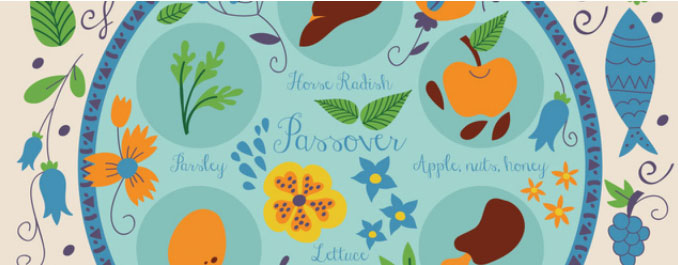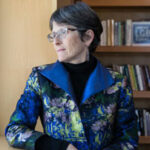Passover Blessing for the Month of Nisan: May We Turn Toward One Another

Dear friends,
 A friend wrote to me the other day and said, “I mishandled a glass bowl this morning in my kitchen. It shattered . . . immediately and with stunning force. I was surprised that this shattering felt like nothing to me, as if shattering is something I have grown so accustomed to these days and months.”
A friend wrote to me the other day and said, “I mishandled a glass bowl this morning in my kitchen. It shattered . . . immediately and with stunning force. I was surprised that this shattering felt like nothing to me, as if shattering is something I have grown so accustomed to these days and months.”
This has been a shattering year for our people. And not only for our people.
October 7 — and the brutal war that it launched in Israel and Gaza — has left so much broken. In our darkest moments, we fear it has left our world shattered beyond repair. The shards are everywhere. Shattered hearts, families, homes, dreams, lives.
How do we come to the seder table this year? Even our questions feel broken — the innocence of the Four Questions splintering into a thousand questions we don’t know how to answer, and some we barely know how to ask.
I don’t know what it will feel like to gather around the seder table this year, but I do know that this is where we need to begin. Not with well-rehearsed scripts and self-righteous slogans, but with the questions we don’t know how to answer and with the questions we barely know how to ask. The Mishnah makes this clear already almost 2,000 years ago. The seder can only truly begin when at least one genuine question has been voiced. (Our sages stress that the rote recitation of the Four Questions doesn’t count.) This story — the story of our redemption from slavery — starts when we ask ourselves and each other honest questions.
This will not be easy. It never is. But especially not at a time when many communities – and many families – are struggling with deep ruptures and divisions about the war in Israel and Gaza, and about what this moment demands of us as Jews. Almost every day now, a friend or colleague or community member will tell me: “I just don’t know how to talk to my child anymore.” “My son is not speaking to his cousin.” “I have lost several friends over this war.” “I’m so afraid of what our family seder will be like this year.”
It will not be easy, but the seder is the moment in the Jewish year, more than any other, when we remember the value that Judaism places on the process of authentic questioning. The seder calls upon us to invite and encourage serious, difficult, even challenging questions. But it also calls upon us to make sure that the questions we ask are offered in a spirit of genuine openness, in an effort to understand. We’ve all been on the receiving end of questions that silence us or shut us down. If you find yourself asking a question that begins with “How can you . . .?” or “Don’t you think . . .?” — take a moment to consider whether you are asking a question at all.
While I have heard an enormous amount of pain on the part of both parents and children (and teachers and students) over these last several months, I’ve also witnessed — and experienced — the ways in which an honest conversation can crack the heart open a little and allow the hard ground between us to soften.
There is a moment in the seder that feels especially poignant to me this year — the moment of Yachatz, when we lift the middle matzah and break it in two. The larger piece is hidden, to remind us that more is concealed than revealed, to remind us how much we do not know, how much we do not see, how much we have yet to understand. The larger piece is hidden and wrapped in a napkin. This becomes the afikoman. It is up to the children to find it before the Seder can come to an end. How striking that, in this ritual game of hide and seek, we remind ourselves that we do not begin to know all that our children will reveal to us. We do not begin to understand the mysteries they will uncover, the broken pieces they will find, the hidden fragments in need of repair.
Perhaps the afikomen that comes at the close of the seder meal is a kind of echo and response to the words of the Prophet Malachi, that come at the close of the haftarah we will recite on Shabbat Hagadol, just before Pesach begins. “Behold the day is coming, when Elijah will turn the hearts of the parents toward their children and the hearts of the children toward their parents.”
As we move into this month of Nisan and prepare our homes and our hearts for Passover, may we turn toward one another, listening for each other’s questions, looking for each other amidst the broken fragments.
And may we discover moments of sweetness in the search.
Rabbi Sharon Cohen Anisfeld is President of Hebrew College in Newton, MA. Hebrew College is reimagining Jewish learning and leadership for an interconnected world, making our lives more meaningful, our communities more vibrant, and our world more whole.
Explore Graduate Programs Adult Learning Classes Support Our Work

